HOME > Exhibitions > Past
-
Special Exhibition Commemorating Designation as an Important Cultural Property
Suzuki Kiitsu's Mountain Streams in Summer and Autumn
- Wednesday, November 3 - Sunday, December 19, 2021
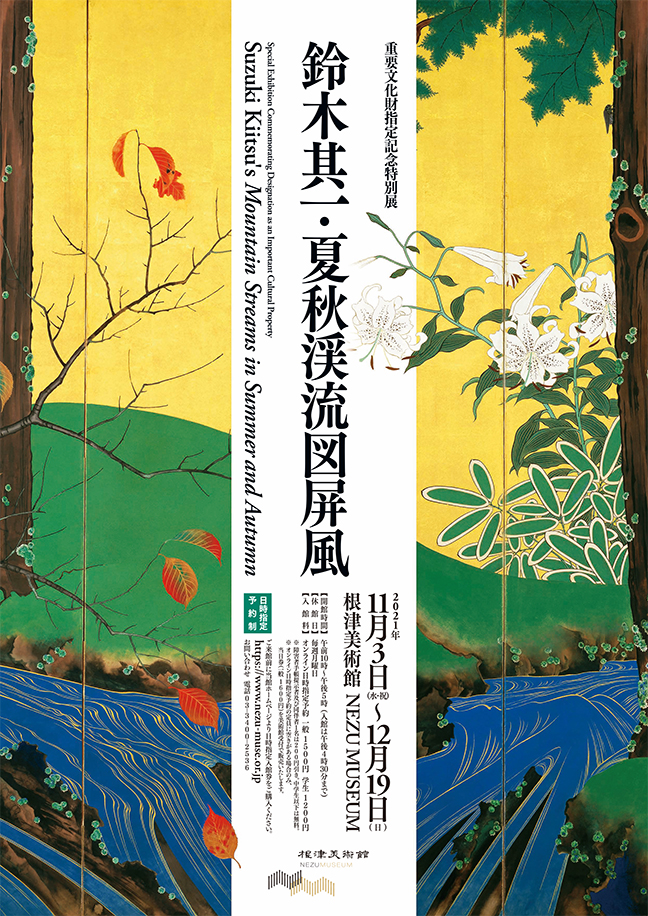

| Closed | Mondays |
|---|---|
| Hours | 10 a.m. - 5 p.m.(last entry: 4:30 p.m.) |
| General admission | Adult 1500 yen, Student 1200 yen |
| Gallery | 1/2 |
Mountain Streams in Summer and Autumn, by Suzuki Kiitsu (1796-1858) depicts a Japanese cypress grove, streams rushing through the rocky mountain side, with a strong sense of reality yet filled with an eerily mysterious feeling.
Kiitsu had been the leading pupil of Sakai Hōitsu (1761-1828), an Edo-based artist who venerated Ogata Kōrin (1658-1716), who was active in Kyoto a century earlier, and founded the Edo Rimpa school. Not content merely to carry on his master’s style, Kiitsu expressed his individuality by adding a thoroughly realistic mode of expression, a sharp sense of design, and at times fantastic images. At the heart of Kiitsu’s oeuvre is a masterpiece, his most singular creation, Mountain Streams in Summer and Autumn. This pair of folding screen paintings was the first work by Kiitsu to be designated an Important Cultural Property, in 2020.
This exhibition examines how Kiitsu, while influenced, of course, by Hōitsu and by his studies of Kōrin, also absorbed the styles of artists outside the Rimpa school, including Maruyama Ōkyo, Tani Bunchō, and members of the older Kanō school. He integrated their influences in his work, which continued to be rooted in his realistic perception of nature. Examining those many influences, the exhibition explores the mysteries behind the birth of Mountain Streams in Summer and Autumn.
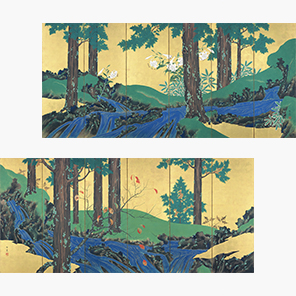

- Mountain Streams in Summer and Autumn
- By Suzuki Kiitsu
-
Japan Edo period, 19th century
Nezu Museum - Streams are flowing through a grove of Japanese cypresses. The righthand screen presents a summer scene, with mountain lilies in bloom. An autumn scene, with cherry tree leaves turning red, occupies the lefthand screen. At first glance, the painting seems realistic. It is, however, full of curious effects, including the thickness of the streams. The cicada perched on a tree trunk near the center of the righthand screen gives the picture plane an odd air of tranquility.
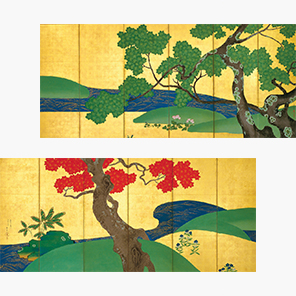
- Green and Red Maple Trees
- By Sakai Hōitsu
-
Japan Edo period, dated 1818
Private Collection - A work with the same composition as this pair of folding screens is included in Kōrin Hyakuzu, One Hundred Pictures by Ogata Kōrin, which Hōitsu himself compiled. We thus know that this work by Hōitsu was created based on a painting by Kōrin. Mountain Streams in Summer and Autumn is similar to this work in its strong colors, glowing against the gold backing, and the rendering of the striped bamboo grass, in a style that reflects the image of Kōrin prevalent in the nineteenth century.
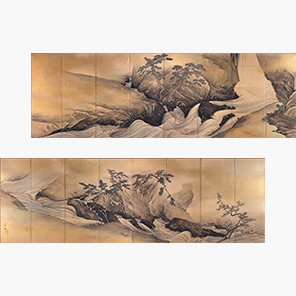

- The Hozu River
- By Maruyama Ōkyo
-
Japan Edo period, dated 1795
Chiso Co., Ltd - These folding screens were Maruyama Ōkyo’s last major work, painted in the year he died. Its composition, with rushing streams flowing from the left and right of the screens and from the depths towards the center, is shared with Mountain Streams in Summer and Autumn. Hōitsu was influenced by Ōkyo’s realistic style, and Kiitsu also revered Ōkyo.
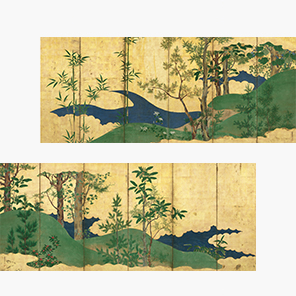
- Trees, Flowers, and Mountain Streams
- By Yamamoto Soken
-
Japan Edo period, 17th-18th centuries
Private Collection - The composition of this work resembles that of Mountain Streams in Summer and Autumn in the green mounds and many trees, trimmed by the limits of the picture plane. The artist was Yamamoto Soken (d. 1706), a Kyoto Kanō school painter with whom, some would argue, Ogata Kōrin studied. Did Kiitsu see Soken’s works when he was visiting Kyoto?










